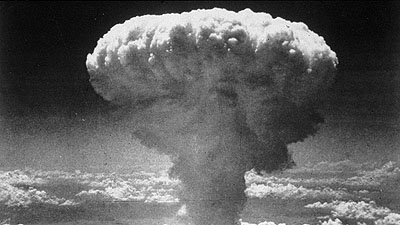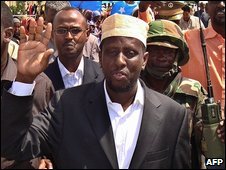Before anything else: Yes, I know. America isn't perfect. I've written about that before: "
United States of America: 232 Years in the Freedom Business" (July 3, 2008). And, I think that war isn't at all pleasant. Things get broken, people get hurt and people die. That feels bad, and I don't like it.
This Man was Very 'Lucky' - One Way or the Other
Business is business, even during war. Not all that long ago, a man on a business trip was a little too close to an attack, and was burned on the upper left side of his body. The burns were serious enough to keep him in that city overnight. He was well enough to return to his home, in another city, the next day.
The day after that, there was a major attack near his home. He was far enough away that time, but he got hurt four days later, while searching for relatives.
I'll let you decide whether he was 'lucky,' because he didn't get killed either time, or 'unlucky' because he got hurt each time.
The Rest of the Story
With a respectful tip of the hat to the late Paul Harvey.
The businessman's name is Tsutomu Yamaguchi. He was an engineer, working for Mitsubishi Heavy Industries Nagasaki Shipyard & Machinery Works, in Hiroshima, on August 9, 1945. He lived in Nagasaki, and wasn't hurt when the second nuclear bomb hit his home city.
He was about 3 kilometers (a little under 2 miles) away from ground zero, both times. He picked up residual radiation in Hiroshima when he got within 2 kilometers of ground zero, on his way to a train. On August 13, he was near ground zero in Nagasaki, searching for relatives.
I'll skip the obligatory America-bashing. You've read it all before, anyway.
1You may not have read what I wrote in an earlier post:
"
What happened to those two cities was terrible. But the policies of the Empire of Japan could not be tolerated - and ending the war by a conventional invasion would have involved massive losses on both sides, along with much more widespread destruction than the obliteration of two cities."
I'm one of the people who is alive today because of Truman's decision. My guess is that quite a few people in Japan also are aware of forebears who would not have survived to be their grandparents and parents, if Truman had taken a 'no nukes' approach."
(
January 25, 2008)
I'll admit to a bit of hyperbole there. Substantial portions of Hiroshima and Nagasaki were
not "obliterated," but in America it's customary to assume that each city was completely destroyed: that makes us feel more guilty.
Tsutomu Yamaguchi is in the news today because he's the first officially-recognized double nuclear victim: someone who was hurt by both nuclear bombs. Since 1957, he's been getting monthly allowances and free medical check-ups. In America, that'd be a Federal thing. In Japan, payments seem to be handled by
cities. Mr. Yamaguchi gets benefits because he's a hibakusha, (means 'radiation survivor,' I read). Japan hasn't paid his funeral expenses yet: but I imagine that Mr. Yamaguchi is in no hurry to get that benefit.
Somebody Survived Hiroshima and Nagasaki: So What?
Mr. Yamguchi's survival is a very big deal for his family: If the news articles I've read mentioned his children and descendants, I missed that detail. I also haven't learned whether he found his relatives, or (more likely) their remains, back in 1945. The articles I read didn't even specify what the relationship was.
War Isn't Nice
The account of Tsutomu Yamaguchi is a fine human interest story: and a valuable reminder that war isn't pleasant. As I wrote before, things get broken, people get hurt, and some die. That's unpleasant.

On the Whole, I'm Glad that Japan is Doing Well
Just the same, although I'm glad that Tsutomu Yamaguchi is alive, and I sympathize for the losses he suffered, I'm not sorry that I'm alive, too.
If Harry S. ("The buck stops here") Truman had not given the order to drop nuclear devices, I might not be.
I'm quite interested in, and have a great deal of respect for, the people, culture, and history of Japan. But, the Empire of Japan had policies which weren't acceptable. America had, finally, become involved in a war which resulted - directly and indirectly - from a pronounced dissatisfaction with those policies.
One way or another, there would be an end to the American involvement in the Pacific theater that started with Pearl Harbor.
One option was to launch a conventional invasion. That would have been, to put it mildly, messy. It's almost a dead certainty that my father, who served on an LST, would not have survived. If your forebears lived in Japan around 1945, the odds are good that they would not have survived. And you wouldn't be here, reading this post.
Another option was to give the impression that America had a stockpile of atomic bombs, and had started using them. This was a colossal bluff. If Japanese leaders had waited longer, they might have realized that America had only two such devices: and had used both.
The war could then have lasted long enough for a full-scale, spectacularly lethal, invasion: and I wouldn't be writing this. And, possibly, you wouldn't be reading it.
Perhaps now it's more obvious, why I don't feel all that guilty about Hiroshima and Nagasaki. I will not feel remorse for people being alive today, who might otherwise never have been born.
Japan, America, and Toyotas in the Ford Plant's Parking Lot
A few decades ago, when some Americans were (as usual) complaining about cars and international trade, somebody pointed out how many Volkswagons, Toyotas, and other foreign cars were in the parking lot of a major American auto maker. I don't remember which one: I picked "Ford" for the headline, because it's a short word.
Japan wasn't in very good shape right after WWII. Today, it's a country which has been giving America good competition in a number of fields. And, produces what are arguably the world's cutest robots.
Japan's prosperity is, I think, a result of the energy, drive, loyalty, and willingness to work that is part of Japanese values: Values which are shared by America, and heartily despised in some of this country's 'better' circles.
America helped Japan get back on its feet. It's not something that's talked about much here. For starters, America's policy of helping with
Japan's economic recovery after WWII isn't at all consistent with the image of America as a racist oppressor.
Looks like we learned something from the
Reconstruction and Versailles.
Related posts:
In the news:
Background:
1 If your life won't be complete without one more bit of America-is-terrorist writing, check out "
Nagasaki–The First Face of Nuclear Terrorism" Levellers (August 9, 2007).
According to the author, not only was the crew of the bomber American (everybody knows what the American military is like), "
The crew of the bomber was Catholic...." That's news to me, but might be true.
I did know that many Catholics lived in Nagasaki, including the nuns in a convent which was destroyed by the nuclear device. I haven't confirmed that "
the largest Catholic church, monastery and convent in Asia." But, that could be true.
But, I still won't curl up in an anguished knot of abject guilt over an act that almost certainly saved a great many lives in Japan - and America. The 'America is a racist oppressive warmonger' conditioning didn't quite take, in my case.


